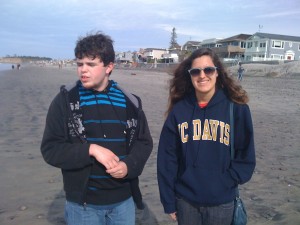When my daughter Rebecca moved away to college four years ago, it was difficult. At the time I joked that she left me living with two non-verbals (my husband and Jeremy) but that is what it felt like. Rebecca was vivacious, energetic, very verbal and social, with friends in and out of the house. I loved hearing the laughter (the sweetest sound in the world) emanating from her bedroom or the family room downstairs.
The other difficulty was the concern I had, like most parents, of how your teenager will do being away from home. Will she make wise choices? Have we taught her enough about staying safe without making her paranoid? Have we taught her enough about staying organized, doing household chores and cooking so that she will be a good roommate once she moves out of the dormitory? (To be honest, she never showed any enthusiasm for any household activities, except perhaps baking chocolate chip cookies from scratch).
Now it is Jeremy’s turn to move out, and I am torn by many emotions. Before, Jeremy’s move was a theoretical construct. Now it is official; word came from the powers that be in recent days. We have been preparing for this moment for a long time; in fact we have been advocating for many years for this to happen. I’ve been bracing myself for this moment for some time, and it is finally here. Jeremy and I have written abut this in A Full Life with Autism, and I’ve discussed it some in Autism Spectrum Disorder (revised).
On the one hand, I am not getting any younger and I am really exhausted from the level of care and supervision Jeremy needs, as well as supporting him in reaching his goals as a writer, advocate and artist. It would be OK if all I did was support Jeremy, but I must earn a living as well, and exercise to stay healthy and strong. We are lucky in that we have some help from the system that pays for some hours of respite and support to Jeremy. But that requires my time and energy – finding, training, supervising staff and teaching Jeremy to have a larger role in that. Thus why I have little downtime or social life.
But the wonderful support staff who are in and out of here with Jeremy for part of the day have somewhat filled part of the void left by Rebecca in terms of young energy and vivaciousness (obviously they could never replace her as my daughter!). I realize when Jeremy moves out, not only will I miss him, but I will miss the support staff and Handsome the dog. As a writer, I have at times missed the lack of privacy with people and Jeremy coming and going in the house, but I realize that the Afternoon Angels and Jeremy’s Team have been an important part of my social life for some time now. And when Jeremy goes, so will they.
As we start telling friends and family Jeremy is really moving within the next six months, the most common reaction is “you won’t know what to do with yourself.” Actually, I have a pretty good idea – focus on my health and exercise, work on a pilot program that is currently in concept stage, accept more speaking gigs, earn more money to help pay for Jeremy’s housing costs (and Rebecca’s college loans), write that book I have always wanted to write (it doesn’t have autism in the title!), and sleep a bit more. Most of all, I will be able to live spontaneously: not have to check the schedule to make sure I have ‘Jeremy coverage’ before saying yes to some much needed ‘me’ time – taking a walk, having a cup of coffee or glass of wine with a friend, going to the movies with my husband.
I know it will not be easy emotionally speaking – I will miss Jeremy, just as I missed Rebecca when she moved away (and still miss her). But I know we are very connected, and nothing will ever change that.



